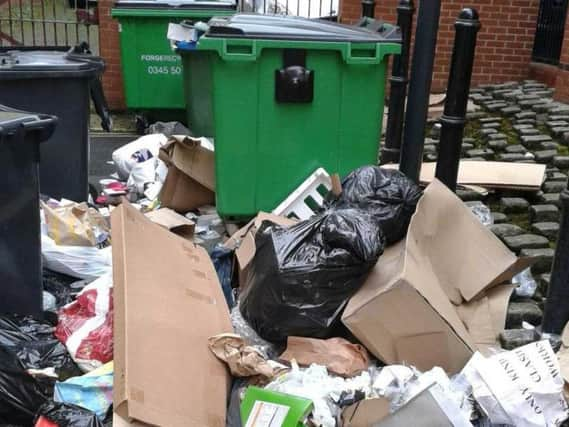'Council cuts are causing a health hazard as streets fill with overflowing bins'


It explains the cuts to neighbourhood services which many of us will have noticed, writes David Behrens.
Spending on bins, planning, potholes and leisure in particular is said to have fallen by more than £3bn in the last five years.
Advertisement
Hide AdAdvertisement
Hide AdThis week, it emerged that only one council in four now empties its bins every week. In some areas, emptying of non-recyclable waste takes place only every three weeks.
Such cuts are hard to reconcile with the fact that, according to its published records, my own council spent nearly £120,000 on taxis in the space of one month this summer.
At an average fare of £8, that works out at something like 500 cabs a day. And all had been booked by the “street scene and waste management” department.
Are they emptying the bins by taxi now? I listened out on Tuesday morning for the sound of an Uber trundling slowly down the road, pursued by men in orange jackets with bin liners slung over their shoulders. But I saw only the regular bin wagon.
Advertisement
Hide AdAdvertisement
Hide AdI asked the council what was going on. Ah, they said, those would be the daily return journeys for the 1,200 “clients” they were required to take to and from centres for adults and children with special educational needs.
Seriously? In a sector with a politically correct euphemism for everyone and everything, the transportation of vulnerable people is delegated to the waste management department? “The cost is accounted for in the budget for our waste, fleet and transport service,” they said. Charming.
Obviously, these journeys are necessary and involve, they say, 120 different locations. But given that the council has its own fleet of minibuses, it still seems like a lot of taxis.
Adult social care is by far the biggest expense by councils, and it is facing a funding crisis. The Association of Directors of Adult Social Services said this week that reform of the system must be a national priority. I agree, and I suggest they start by cutting a better deal with the transport department.
Advertisement
Hide AdAdvertisement
Hide AdBut the need to save money in one public service should automatically trigger cuts to another. There are less public and, frankly, less important services that could go first. My council, for instance, has nearly 200 people in its human resources department.
Bin emptying in particular is a service that everyone needs; it cuts across every age and social demographic. It is more universal even than education. Not everyone needs the services of
a school, although most would agree that the maintenance of them is in the interest of us all.
But unemptied, over-full bins are a health hazard. It is the council’s job to empty them regularly, irrespective of anything else they do or don’t do. Councillors will tell you that less regular collections mean that people will have to recycle more – yet recycling rates actually fell last year.
Advertisement
Hide AdAdvertisement
Hide AdBesides, the commitment to “green waste” of the two councils closest to me – Leeds and Bradford – is undermined by their inability to put in place an agreement for the reciprocal use of each other’s recycling sites, even though one of them is just 500 feet from the other’s border.
Here’s another example of misplaced penny-pinching by Bradford, which fancies itself as a tourist destination, largely because of the incongruous inclusion of Ilkley and Haworth in its patch. It has insisted on closing the two public loos in Haworth because they cost too much to maintain. This despite the fact that the parish council there is trying to persuade coach drivers to let their passengers stay for longer in the village – passengers for whom the presence of a loo would seem to be a minimum requirement.
And how much does it cost to maintain a loo, anyway? I have two in my house which require nothing more than a few rolls of paper and the occasional bottle of Dettol.
No-one doubts, of course, that when councils – or anyone else, for that matter – see their income shrink they must reduce their outgoings accordingly. But I do seriously doubt the ability of those in our town halls to prioritise the spending of what cash they have left and to maintain a sense of perspective on which services are important, and which should just be put out with the bins.